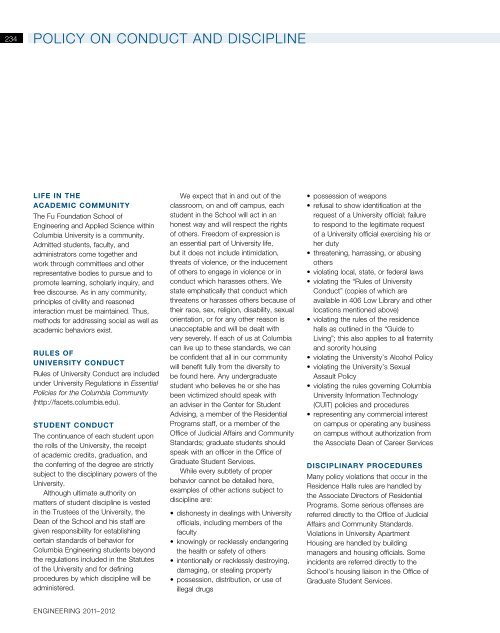2011-2012 Bulletin â PDF - SEAS Bulletin - Columbia University
2011-2012 Bulletin â PDF - SEAS Bulletin - Columbia University
2011-2012 Bulletin â PDF - SEAS Bulletin - Columbia University
Create successful ePaper yourself
Turn your PDF publications into a flip-book with our unique Google optimized e-Paper software.
234<br />
Policy on Conduct and Discipline<br />
Life in the<br />
Academic Community<br />
The Fu Foundation School of<br />
Engineering and Applied Science within<br />
<strong>Columbia</strong> <strong>University</strong> is a community.<br />
Admitted students, faculty, and<br />
administrators come together and<br />
work through committees and other<br />
representative bodies to pursue and to<br />
promote learning, scholarly inquiry, and<br />
free discourse. As in any community,<br />
principles of civility and reasoned<br />
interaction must be maintained. Thus,<br />
methods for addressing social as well as<br />
academic behaviors exist.<br />
Rules of<br />
<strong>University</strong> Conduct<br />
Rules of <strong>University</strong> Conduct are included<br />
under <strong>University</strong> Regulations in Essential<br />
Policies for the <strong>Columbia</strong> Community<br />
(http://facets.columbia.edu).<br />
STUDent conduct<br />
The continuance of each student upon<br />
the rolls of the <strong>University</strong>, the receipt<br />
of academic credits, graduation, and<br />
the conferring of the degree are strictly<br />
subject to the disciplinary powers of the<br />
<strong>University</strong>.<br />
Although ultimate authority on<br />
matters of student discipline is vested<br />
in the Trustees of the <strong>University</strong>, the<br />
Dean of the School and his staff are<br />
given responsibility for establishing<br />
certain standards of behavior for<br />
<strong>Columbia</strong> Engineering students beyond<br />
the regulations included in the Statutes<br />
of the <strong>University</strong> and for defining<br />
procedures by which discipline will be<br />
administered.<br />
We expect that in and out of the<br />
classroom, on and off campus, each<br />
student in the School will act in an<br />
honest way and will respect the rights<br />
of others. Freedom of expression is<br />
an essential part of <strong>University</strong> life,<br />
but it does not include intimidation,<br />
threats of violence, or the inducement<br />
of others to engage in violence or in<br />
conduct which harasses others. We<br />
state emphatically that conduct which<br />
threatens or harasses others because of<br />
their race, sex, religion, disability, sexual<br />
orientation, or for any other reason is<br />
unacceptable and will be dealt with<br />
very severely. If each of us at <strong>Columbia</strong><br />
can live up to these standards, we can<br />
be confident that all in our community<br />
will benefit fully from the diversity to<br />
be found here. Any undergraduate<br />
student who believes he or she has<br />
been victimized should speak with<br />
an adviser in the Center for Student<br />
Advising, a member of the Residential<br />
Programs staff, or a member of the<br />
Office of Judicial Affairs and Community<br />
Standards; graduate students should<br />
speak with an officer in the Office of<br />
Graduate Student Services.<br />
While every subtlety of proper<br />
behavior cannot be detailed here,<br />
examples of other actions subject to<br />
discipline are:<br />
• dishonesty in dealings with <strong>University</strong><br />
officials, including members of the<br />
faculty<br />
• knowingly or recklessly endangering<br />
the health or safety of others<br />
• intentionally or recklessly destroying,<br />
damaging, or stealing property<br />
• possession, distribution, or use of<br />
illegal drugs<br />
• possession of weapons<br />
• refusal to show identification at the<br />
request of a <strong>University</strong> official; failure<br />
to respond to the legitimate request<br />
of a <strong>University</strong> official exercising his or<br />
her duty<br />
• threatening, harrassing, or abusing<br />
others<br />
• violating local, state, or federal laws<br />
• violating the “Rules of <strong>University</strong><br />
Conduct” (copies of which are<br />
available in 406 Low Library and other<br />
locations mentioned above)<br />
• violating the rules of the residence<br />
halls as outlined in the “Guide to<br />
Living”; this also applies to all fraternity<br />
and sorority housing<br />
• violating the <strong>University</strong>’s Alcohol Policy<br />
• violating the <strong>University</strong>’s Sexual<br />
Assault Policy<br />
• violating the rules governing <strong>Columbia</strong><br />
<strong>University</strong> Information Technology<br />
(CUIT) policies and procedures<br />
• representing any commercial interest<br />
on campus or operating any business<br />
on campus without authorization from<br />
the Associate Dean of Career Services<br />
Disciplinary Procedures<br />
Many policy violations that occur in the<br />
Residence Halls rules are handled by<br />
the Associate Directors of Residential<br />
Programs. Some serious offenses are<br />
referred directly to the Office of Judicial<br />
Affairs and Community Standards.<br />
Violations in <strong>University</strong> Apartment<br />
Housing are handled by building<br />
managers and housing officials. Some<br />
incidents are referred directly to the<br />
School’s housing liaison in the Office of<br />
Graduate Student Services.<br />
engineering <strong>2011</strong>–<strong>2012</strong>







